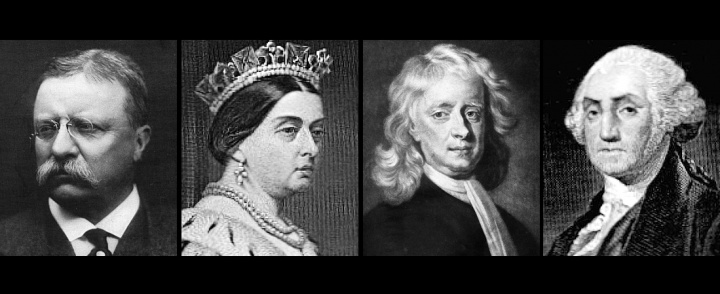In Their Own Words
Great Men and Women Who Highly Respected the Bible

Sir Francis Bacon (1561-1626), known as the father of the scientific method, wrote, "There are two books laid before us to study, to prevent our falling into error; first, the volume of Scriptures, which reveal the will of God, then the volume of the Creatures [Creation], which express His power."
John Locke (1632-1704), the noted English philosopher, wrote: "The Bible is one of the greatest blessings bestowed by God on the children of men. It has God for its author, salvation for its end, and truth without any mixture for its matter. It is all pure, all sincere; nothing too much; nothing wanting."
The noted French writer and philosopher Jean-Jacques Rousseau (1712-1778) wrote: "The majesty of the Scriptures strikes me with admiration, as the purity of the Gospel has its influence on my heart. Peruse the works of our philosophers; with all their pomp of diction, how mean, how contemptible, are they, compared with the Scriptures! Is it possible that a Book at once so simple and sublime should be merely the work of man?"
The brilliant German scholar and philosopher Immanuel Kant (1724-1804) said: "The existence of the Bible, as a book for the people, is the greatest benefit which the human race has ever experienced. Every attempt to belittle it is a crime against humanity."
The brilliant German writer, poet and thinker Johann Wolfgang von Goethe (1749-1832) said: "Belief in the Bible, the fruit of deep meditation, has served me as the guide of my moral and literary life. I have found it a capital safely invested, and richly productive of interest."
The great Scottish novelist and poet Sir Walter Scott (1771-1832) wrote: "The most learned, acute, and diligent student cannot, in the longest life, obtain an entire knowledge of this one Volume. The most deeply he works the mine, the richer and more abundant he finds the ore; new light continually beams from this source of heavenly knowledge to direct the conduct, and illustrate the work of God and the ways of men; and he will at last leave the world confessing that the more he studied the Scriptures the fuller conviction he had of his own ignorance, and of their inestimable value."
Daniel Webster (1782-1852), American statesman and political leader, said, "If we abide by the principles taught by the Bible, our country will go on prospering."
Horace Greeley (1811-1872), the famous 18th-century newspaper editor and reformer, stated, "It is impossible to mentally or socially enslave a Bible-reading people."
William Gladstone (1809-1898), famous 19th-century British prime minister, said: "I have known 95 of the world's great men in my time, and of these, 87 were followers of the Bible. The Bible is stamped with a Specialty of Origin, and an immeasurable distance separates it from all its competitors."
Sir Winston Churchill (1874-1965), the great British Prime Minister, statesman, historian and author, said: "We reject with scorn all these learned and labored myths that Moses was but a legendary figure. We believe that the most scientific view, the most up-to-date and rationalistic conception, will find its fullest satisfaction in taking the Bible story literally."
Wernher von Braun (1912-1977), regarded as the father of the American space program, wrote, "In this age of space flight, when we use the modern tools of science to advance into new regions of human activity, the Bible—this grandiose, stirring history of the gradual revelation and unfolding of the moral law—remains in every way an up-to-date book."
Many American presidents have affirmed their confidence in the Bible. Thomas Jefferson (1743-1826), third U.S. president, stated: "I have always said and always will say that the studious perusal of the Sacred Volume will make better citizens, better fathers, better husbands . . . the Bible makes the best people in the world."
John Quincy Adams (1767-1848), sixth U.S. president, wrote, "So great is my veneration of the Bible that the earlier my children begin to read it the more confident will be my hope that they will prove useful citizens of their country." He also stated: "My custom is to read four or five chapters of the Bible every morning immediately after rising . . . It seems to me the most suitable manner of beginning the day . . . It is an invaluable and inexhaustible mine of knowledge and virtue."
Andrew Jackson (1767-1845), seventh U.S. president, said, "The Bible is the rock on which our republic rests."
Abraham Lincoln (1809-1865), 16th U.S. president, stated: "I believe the Bible is the best book God has ever given to man. All the good from the Savior of the world is communicated to us through this book."
Woodrow Wilson (1856-1924), 28th U.S. president, stated: "I have a very simple thing to ask of you. I ask every man and woman in this audience that from this day on they will realize that part of the destiny of America lies in their daily perusal of this great Book [the Bible]."
Harry Truman (1884-1972), 33rd U.S. president, said: "The fundamental basis of this nation's law was given to Moses on the Mount. The fundamental basis of our Bill of Rights comes from the teaching we get from Exodus and St. Matthew, from Isaiah and St. Paul. I don't think we emphasize that enough these days. If we don't have the proper fundamental moral background, we will finally end up with a totalitarian government which does not believe in the right for anybody except the state."
Ronald Reagan (1911-2004), 40th U.S. president, said, "Within the covers of the Bible are the answers for all the problems men face." He also stated, "Of the many influences that have shaped the United States into a distinctive nation and people, none may be said to be more fundamental and enduring than the Bible."
